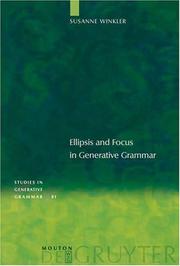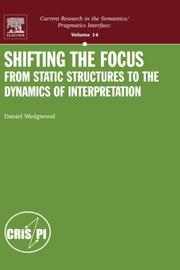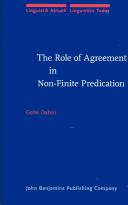| Listing 1 - 3 of 3 |
Sort by
|

ISBN: 9783110890426 3110890429 3110186012 9783110186017 Year: 2005 Publisher: Berlin ; New York : Mouton de Gruyter,
Abstract | Keywords | Export | Availability | Bookmark
 Loading...
Loading...Choose an application
- Reference Manager
- EndNote
- RefWorks (Direct export to RefWorks)
Covering linguistic research on empty categories over more than three decades, this monograph presents the result of an in-depth syntactic and focus-theoretical investigation of ellipsis in generative grammar. The phenomenon of ellipsis most generally refers to the omission of linguistic material, structure and sound. The central aim of this book is to explain on the basis of linguistic theorizing of how it is possible that we understand more than we actually hear. The answer developed throughout this book is that ellipsis is an interface phenomenon which can only be explained on the basis of the complex interaction between syntax, semantics and information structure. Scholars of grammar and cognitive scientists will profit from reading this book.
Grammar --- Focus (Linguistics) --- Generative grammar --- Grammar, Comparative and general --- Ellipsis --- Generative grammar. --- Ellipsis. --- Ellipsis (Language). --- Generative Linguistics.

ISBN: 1280632909 9786610632909 0080457312 9780080457314 0080445772 9780080445779 Year: 2005 Publisher: Leiden; Boston : BRILL,
Abstract | Keywords | Export | Availability | Bookmark
 Loading...
Loading...Choose an application
- Reference Manager
- EndNote
- RefWorks (Direct export to RefWorks)
How direct is the mapping between linguistic constructions and their interpretations? Much less direct than we commonly assume, according to Daniel Wedgwood. Extending current ideas from frameworks like Relevance Theory and Dynamic Syntax, Wedgwood upholds a radical position on modelling linguistic competence: the idea of interfacing static syntactic and semantic representations must be abandoned in favour of models of the incremental construction of meaning during parsing - which may involve significant pragmatic enrichment. In illustration, Wedgwood presents a detailed study of a key meeting point of grammar and pragmatics: focus, in particular its syntactic expression in Hungarian. The result is a strikingly simple explanation of a complex set of syntactico-semantic phenomena, touching on information structure, negation, quantification and complex predication. For its clear and bold theoretical argumentation and its novel analysis of some notorious data, this book will be of interest to all linguists, philosophers and computational linguists concerned with the relationships between syntax, semantics, pragmatics and information structure. This book features a broad theoretical perspective. It offers a coherent overall picture of syntax, semantics and pragmatics - and how they inter-relate. It combines a bold new approach with the insights of existing theory - thorough, novel analysis of linguistic phenomena that historically occupy an important place in the literature, as illustration of a carefully laid out theoretical position. It extends and integrates research from a variety of linguistic domains and frameworks. It also includes a comprehensive informal discussion as well as a formalised analysis.
Focus (Linguistics) --- Pragmatics. --- Pragmalinguistics --- General semantics --- Language and languages --- Logic, Symbolic and mathematical --- Semantics (Philosophy) --- Discourse analysis --- Grammar, Comparative and general --- Philosophy --- Topic and comment --- Lexicology. Semantics --- Pragmatics

ISBN: 9027233543 1283092387 9027285314 9786613092380 9789027285317 9789027233547 Year: 2005 Publisher: Amsterdam ; Philadelphia : J. Benjamins Pub. Co.,
Abstract | Keywords | Export | Availability | Bookmark
 Loading...
Loading...Choose an application
- Reference Manager
- EndNote
- RefWorks (Direct export to RefWorks)
This comparative syntactic study claims that agreement is the most central functional category responsible for licensing predication in finite, non-finite and small clauses alike. Intriguing syntactic phenomena like Icelandic infinitival predicates taking non-nominative (quirky) subjects; psych-impersonal and modal predicates in Italian, Hungarian and Russian; meteorological predicates, existential clauses, post-verbal and null subjects in the so-called null-subject VSO languages can all be better analyzed through a concept of predication that is closely related to AGRP, manifesting subject-verb agreement. The overt agreement marking in Hungarian and Portuguese infinitival clauses further strengthens this view. Obviation and control subjunctive clauses in the Balkan languages, Welsh finite and non-finite infinitival clauses as well as case-marked secondary predicates in Icelandic, Slovak, Hungarian, Russian and Finnish also lend support to an analysis where the [+pred] feature is checked in AGRP.
Grammar, Comparative and general --- Agreement. --- Syntax. --- Topic and comment. --- Verb phrase. --- Predicate (Grammar) --- Verb phrase --- Functional sentence perspective (Grammar) --- Predicate and subject (Grammar) --- Subject and predicate (Grammar) --- Theme and rheme --- Topic and comment (Grammar) --- Focus (Linguistics) --- Language and languages --- Syntax --- Agreement (Grammar) --- Concord (Grammar) --- Agreement --- Topic and comment --- Phrasal verb --- Predicate --- Verbals --- Subject and predicate --- Concord --- Case --- Gender --- Number --- Person --- Linguistics --- Philology --- Grammar, Comparative and general Syntax
| Listing 1 - 3 of 3 |
Sort by
|

 Search
Search Feedback
Feedback About
About Help
Help News
News